🎉👋🏽 Introducing our new Co-Director: Deepti Doshi
Our welcome interview on community, democracy, and product building
We have exciting news: New_ Public has a brand new Co-director to lead the organization alongside Eli Pariser and Talia Stroud. This week we’re officially welcoming Deepti Doshi. Deepti has built a number of organizations at the intersection of social change, community organizing, leadership development, and social media. Her career has taken her to some really interesting places. Here’s Deepti:
Community is the safety in which I grew up. My dad suffers from manic depression and in the moments he wasn't able to be there for us, the most unexpected people provided our stability: Patrick Mativo drove a bright red Cardinal Cab and often took us back and forth to school; Earl would help us fix the cars and things around the house; we watched our neighbors support my mom to take care of us. These people showed up for us because my parents had shown up for them — they are doctors and would often provide medical care and medications for free to Patrick, Earl, and many others. While our family life could be unstable and scary in moments, living at the center of these relationships of generosity and support built safety and confidence. We felt seen.
Deepti lives in Berkeley, California, with her husband and two boys. Most recently, she worked at the world’s largest social media platform where she built products and programs for community leaders and entrepreneurs and helped develop the in-house incubator. She believes deeply that community leaders are the stewards of our democracy. Below, she unpacks how her career has evolved as she’s followed her curiosity, her work at Meta, and New_ Public’s new exploration into product development.
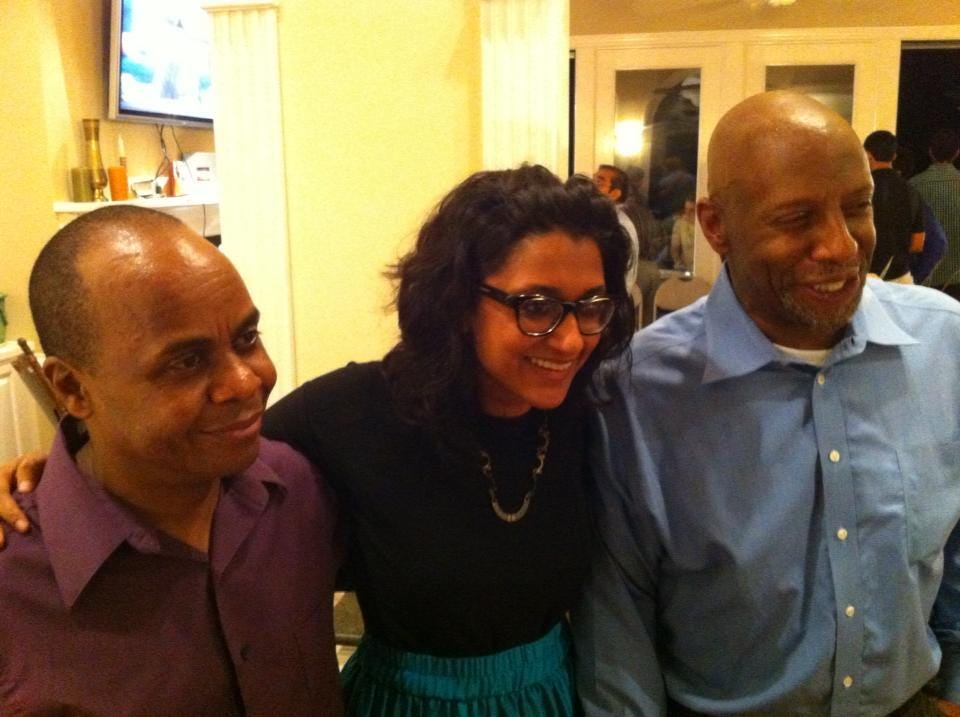
Today, get to know Deepti and what she’s excited to work on with New_ Public in the coming year and beyond. Please feel free to send your welcomes, and any questions, to Deepti on Twitter!
–Josh
Josh Kramer: Where are you coming from, and what brings you to New_ Public?
Deepti Doshi: I come from a Jain family. Most of us are vegetarian, because one of our main tenets is Ahimsa, the principle of non-violence. Another really important but lesser known principle and tenet of our faith is Anekäntaväd, and it means that multiple truths can exist at the same time. It’s my belief in this principle that's bringing me to New_ Public: how can we build technology and social media that serves as a space for people to build community in a way that holds plurality; and how do we scale many of these small spaces to serve as a foundation for a better democracy?
Tell me about your work in India.
I had two different phases of my time in India. The first was influenced by my time at Acumen and a curiosity in how markets and businesses can serve low income populations across the developing world. I started an education business that served low cost private schools in slums in Hyderabad.
That exposed me to how deeply embedded inequity and othering are in our social and political systems, and it sent me to the Kennedy School [of Government] to understand how to equalize power. I studied social movements, met Marshall Ganz, and learned about the tactics of community organizing to distribute power. One of my key lessons was that building better services for people wouldn't necessarily give them more power and agency over their lives. And that my role as a person with privilege was to ensure that decision-making tables always included the people most affected by the problem.
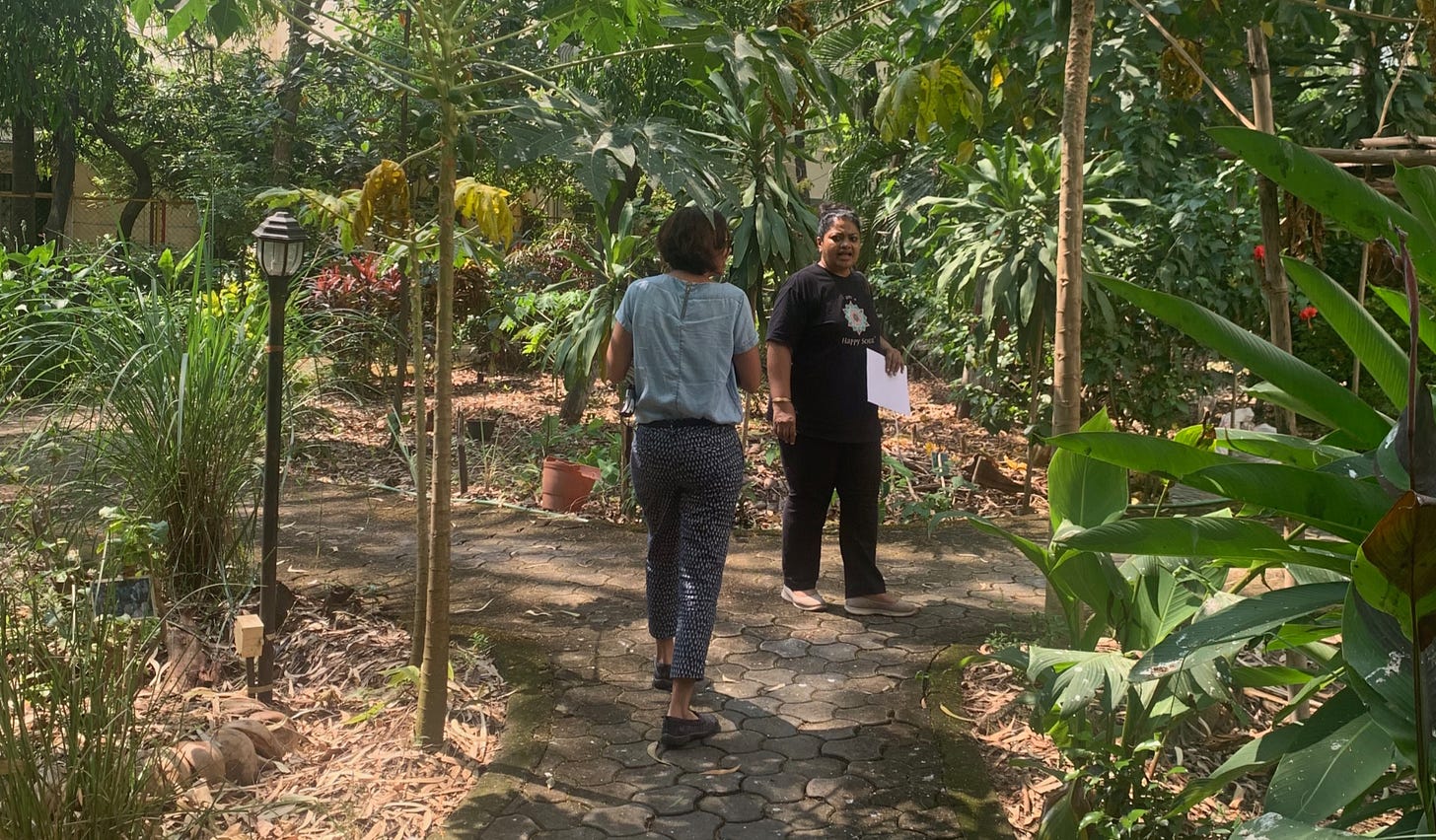
I went back to India without a plan, and casually started helping a friend, Marie Paul, use door-to-door community organizing strategies, that I had just learned, to revitalize her local neighborhood park. I saw people across all kinds of differences work together in ways that I hadn't before: the rich and the poor, the old and the young, Muslims, Hindus and Christians, men and women. It was really beautiful. Actually, I went back to that park a few years ago and it's now a thriving urban garden that's supported by the local municipal government.
Back then in 2012, we scaled this work through creating Haiyya — a grassroots leadership development organization which supported people to run local, issue-based campaigns.
What kind of issues did you work on?
We generally tried to work on issues that affected people — regardless of their economic status — in similar ways. Things you generally couldn't “buy” your way out of. For example, one of our focus areas was women’s safety. It was an issue that everyone cared about, whether rich or poor, no matter your faith. We would first build the cohesion of the community through a local neighborhood project like a neighborhood safety watch, and then define how the local government could support the needs better and approach them to make changes. We also took on issues like sanitation or voting but always at an ultra-local level: block by block.
What brought you to Facebook?
A large number of our community leaders and organizers were college students. They were much more agile with social media than me, and since our organizing would usually happen at nights or weekends, they would keep the coordination of their teams going with Facebook groups and WhatsApp. I became interested in Facebook as a place where the foundations of collective action could be built at scale. And this was shortly after the Arab Spring, which had left me with a lot of curiosity and optimism about the role social media could play in distributing power and strengthening our democracy.
What are some of the things you're most proud of from your time at Facebook?
The projects or teams I built in close proximity with the most overlooked or marginalized populations, who we then gave a seat at the table and invested in their communities. This includes founding our Global Community Partnerships team, which for the first time served Group admins as a valuable part of our ecosystem — these are the people who do the invisible work of managing and moderating communities so they are healthy, cohesive, and are positive contributors to society.
And we were really able to show up for them too: through the Facebook Community Leadership Program my team established, we gave 100 social change groups around the world $10M, a year-long leadership development experience, and invested in increasing their visibility. Today the programs have expanded to include certification, a learning lab, and an accelerator — all of which support group admins to build their identity as what I call “community entrepreneurs,” and allow them to do this work with financial sustainability.
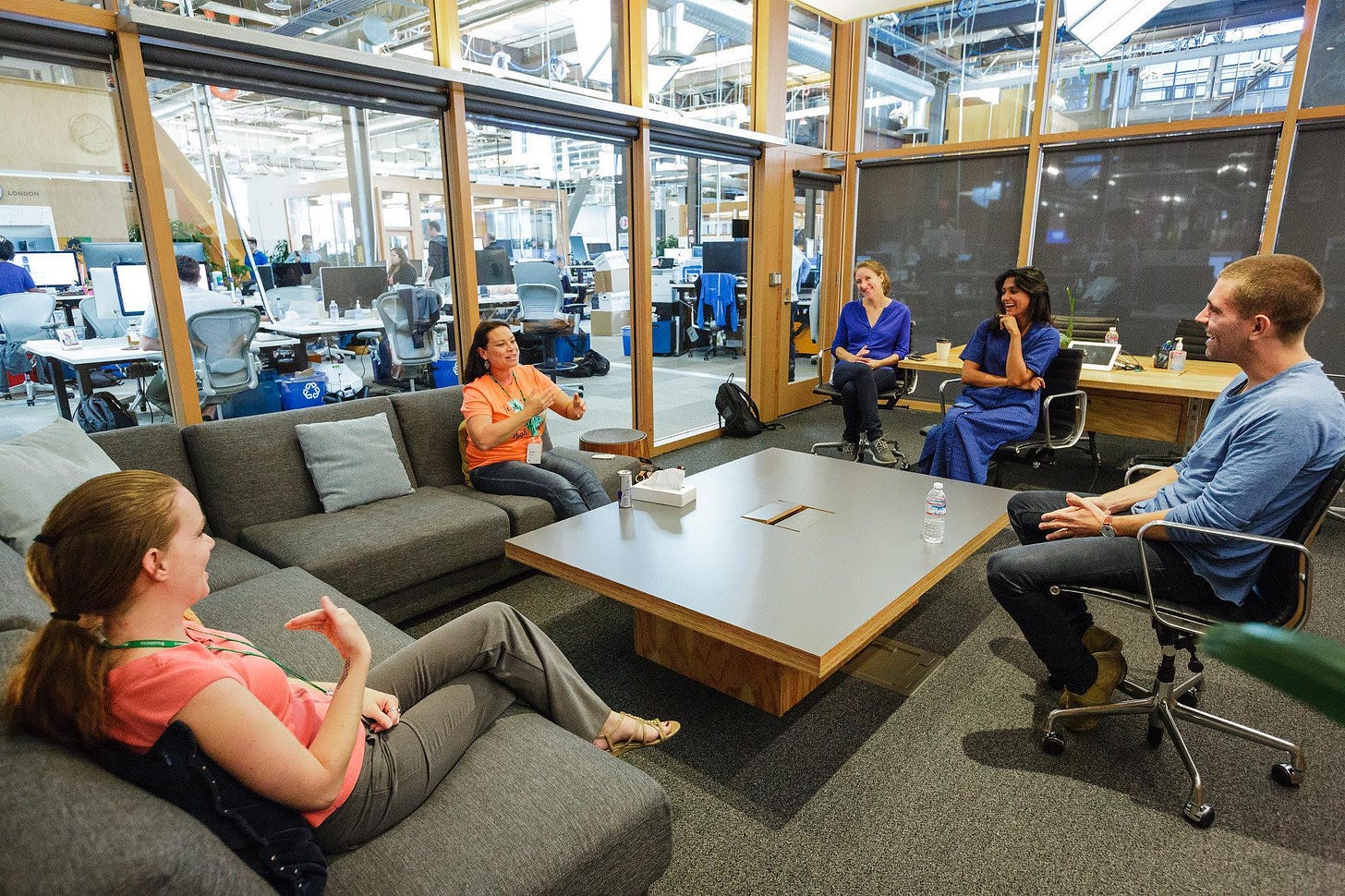
Why did you decide to leave and come to New_ Public?
I really believe in community as the foundation of democracy. It's not the only thing a good democracy needs — we need better service delivery, especially to the most marginalized populations, we need better governance systems, we need reform across many pillars — but community is an important part that's decaying and often underlooked. Putnam talks about this in his book Bowling Alone and has this great quote:
Community connectedness is not just about warm fuzzy tales of civic triumph. In measurable and well-documented ways, social capital makes an enormous difference in our lives... Social capital makes us smarter, healthier, safer, richer, and better able to govern a just and stable democracy.
And given how much of our lives we are living digitally, I think we need new tools and platforms in the world to support community entrepreneurs to build community. I think we need bespoke design patterns that meet a specific need (not one architecture like Facebook Groups), and I think they likely need to be small so that they can encourage conversation and understanding, not “commenting.” And most of all, while I believe they should be products that people enjoy using and that reach people at scale, the north star of their success needs to be creating plurality and cohesion across diverse populations.
Because we’ve all seen that if the north star of success is profitability and the maximization of our profits before everything else, including a pluralistic democracy, that’s where we get into trouble. And I have very viscerally experienced the consequences of this at Facebook over the last few years. And it's not just Facebook, it's a pressure that is plaguing the industry given the expectations of venture funding.
That’s why I am excited to support New_ Public’s transition from a research and field-building organization to one that also builds products. I'm really excited to explore what we can build and demonstrate with more patient capital, including philanthropy.
What are the early steps in taking our community and our research and putting them into action?
Well, we are doing that this year through our Community Lab, where we are running design sprints on very specific problems with the people who are struggling with those problems. We call this sociotechnical design — by that we mean that we don’t just need technical skills, but we need the work to be led by people who are actually living the problems that we're trying to solve and have expertise in the sociological dynamics of how people relate with one another, leading the design process.
For example, there are currently few tools that support parents to build strong relationships with one another around schools and classrooms. Often parents are hacking their way through Facebook groups to connect. In our first sprint in Oakland at the end of this month, we will be focused on building prototypes of products to help parents build stronger communities around diverse public schools.
And over the course of the next 12-18 months, we have plans to run sprints in the areas of faith-based communities, local neighborhood communities, and health and well-being communities in a similar structure.
Can you talk about how this fits in with the Head of Product role we’re hiring for now?
We are looking for a product leader to join our team to lead this work. The role is perfect for a seasoned leader who has been successful at building products that are useful, engaging, and scalable. Someone who shares our commitment to sociotechnical design and is curious about building product in a way where pluralism, deeper relationships, and stronger community can thrive, and is a strong team builder and manager. And to make an additional plug, we are also hiring a Head of Operations and Programs to build and lead our central infrastructure and support the organization as the team scales.
Thanks Deepti!
Community Cork Board
As Deepti mentioned above, our new Community Lab is doing its first design sprint in Oakland at the end of the month. We’re looking for parents or caregivers, design experts, technologists, and researchers to participate. More info here.
On Wednesday, April 27, Next City and Knight Foundation are hosting a really interesting conversation on Public Spaces and Technology. Join panelists Meg Daly (Friends of The Underline), Asima Jansveld (Friends of the High Line), Bryan Boyer (University of Michigan), and moderator Lilly Weinberg (Knight Foundation).
Bowling… but not alone,
Josh
Photos courtesy of Deepti Doshi. Design by Josh Kramer.
New_ Public is a partnership between the Center for Media Engagement at the University of Texas, Austin, and the National Conference on Citizenship, and was incubated by New America.


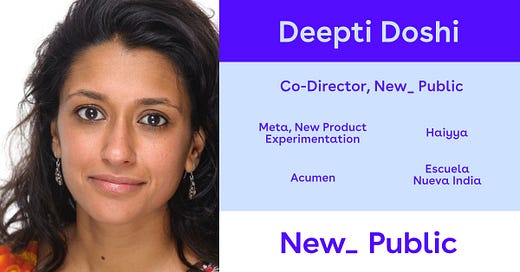


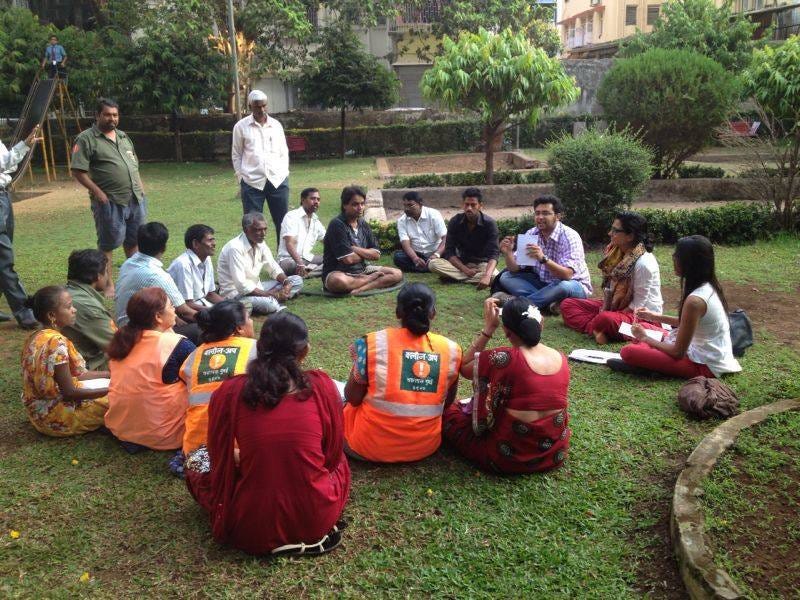

What an exhilarating addition to your team. Thank you & best wishes!